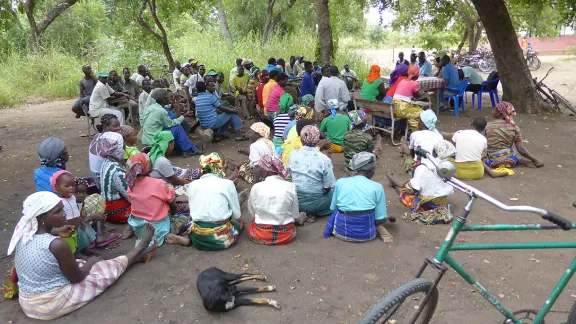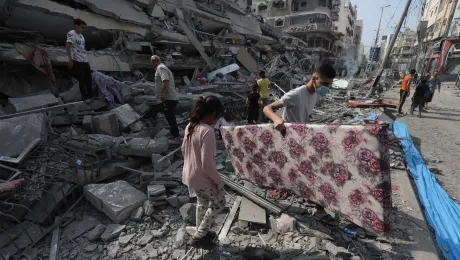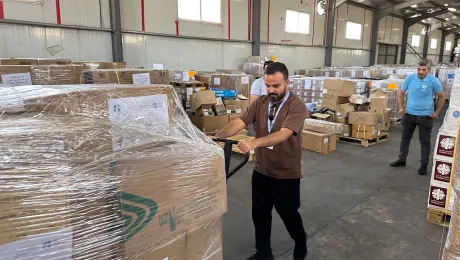
Community consultation in Mozambique prior to UN human rights investigations. Photo: LWF/ S. Oftadeh
(LWI) – The government of Mozambique has accepted most of the human rights issues addressed in the last Universal Periodic Review (UPR).
The UPR is a unique mechanism of the United Nations Human Rights Council aimed at improving the human rights situation on the ground of each of the 193 United Nations Member States. Under this mechanism, the human rights situation of all UN Member States is reviewed every 4.5 years. As part of the process, non-governmental organizations are invited to submit first hand reports, so-called parallel reports. The member states can take these findings into consideration when they present their list of recommendations to the country under review.
The Lutheran World Federation (LWF) is among the civil society organizations that advocated for particular themes with UN member states to raise these topics during the UPR of Mozambique.
Mozambique is still struggling with the legacy of a 16 year civil war which ended in 1992. Although it has since then made slow but steady progress in peace-building and the move to democracy, respect for human rights remains a challenge especially concerning land rights, women’s rights, the right to justice, and the rights of minorities, such as people with disabilities, Albinism, people living with HIV/AIDS, and different sexual orientations.
On 19 January, the UPR working group assessed the human rights situation in Mozambique for the second time since 2011. Present for this assessment was a high level delegation of the Mozambican government, led by the Minister of Justice and Constitutional and Religious Affairs, H.E. Abdurremane Lino de Almeida.
Women’s and land rights remain a challenge
Many of these issues had been brought to the attention of the international community by the Mozambican Human Rights League (Liga dos Direitos Humanos, or LDH). Through a series of consultations and by lobbying, they made sure the voice of civil society was heeded and taken into account during the review. The LWF contributed by conducting the first UPR workshop in Maputo and also coordinating the global UPR advocacy for the Mozambican civil society organizations.
“I am happy that most of the recommendations we advocated for were addressed by many member States today and I am hoping for my government to accept those recommendations,” Dr. Sousa Goncalves Shelle, Head of Strategic Planning Department for LDH, stated after the review, at the debriefing side event organized by the LDH, LWF and the International Federation for Human Rights (FIDH). On the same panel, Nordine Ferrao, LWF Mozambique Advocacy Officer, said, “I am glad that the issue of land rights was raised today, although not by many states, because it is a very important issue for many Mozambicans living in rural areas.”
On the other hand, Dr Alice Mabote, founding member of LDH, challenged the government’s claim of implementing 90% of the first cycle of UPR recommendations. She cited a lack of transparency in the monitoring process and a number of lingering issues from the first review, such as implementation of women’s rights to inheritance, combating discrimination against girls in education, corruption and impunity of law enforcement agencies. Moreover, Dr Mabote expressed her concern at the lack of adequate attention being given to some of the pressing issues during the review, such as the fragile peace process and electoral violence in some parts of the country.
Constructive dialogue with government
Despite the challenges, the delegation of civil society organizations from Mozambique welcomed the dialogue between the government delegation and other member states as constructive. As the government of Mozambique demonstrated their cooperation with the UPR mechanism by sending a high level delegation to Geneva, civil society organizations (CSO) expect to continue the dialogue for implementation with respective government departments. Throughout the review, the CSO delegation observed a number of areas where it can work with the government to improve human rights on the ground and accelerate implementation of laws.
“We look forward to following up on these recommendations,” says Dr Shelle of the LDH. “We expect the government to sit together with the CSOs and draft a transparent UPR implementation strategy and action plan that can be verified through clear indicators.”


